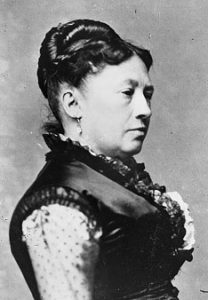
Bessie Coleman
Bessie Coleman (born Atlanta, Georgia, 1893; died Jacksonville, Florida, April 30, 1926) was the first African-American woman to earn an airplane pilot’s license. Children could view a website devoted to Bessie Coleman at: Bessie Coleman. Children could also read Talkin’ About Bessie, written by Nikki Grimes and illustrated by E. B. Lewis.
Mary Elizabeth Mapes Dodge (born New York, New York, 1831; died Onteora Park, New York, August 21, 1905) was an author and an editor. Her most famous work is Hans Brinker; or The Silver Skates. The 1865 novel has had more than one hundred editions and has been translated into at least six other languages. Children could see a tribute to her at: Mary Mapes Dodge. Children could read some of her works at: Project Gutenberg.
Jules Feiffer (born New York, New York, 1929; died Richfield Springs, New York, January 17, 2025) was a cartoonist. He illustrated The Phantom Tollbooth, written by Norton Juster. He wrote and illustrated a number of books for children, including A Room with a Zoo and The Daddy Mountain. In 2007 his daughter Kate wrote Henry, the Dog with No Tail; he illustrated her book. He received the 1986 Pulitzer Prize for his editorial cartoons.
 Julia Dent Grant (born St. Louis, Missouri, 1826; died Washington, D. C., December 14, 1902) was America’s First Lady from March 4, 1869 to March 4, 1877. She was the wife of Ulysses Grant, the eighteenth president of the United States. Grant was an army officer, and much of their married life was spent on the frontier in the garrisons. Mrs. Grant actually enjoyed the comparatively easy life of the White House. Children could visit a website at: Julia Dent Grant.
Julia Dent Grant (born St. Louis, Missouri, 1826; died Washington, D. C., December 14, 1902) was America’s First Lady from March 4, 1869 to March 4, 1877. She was the wife of Ulysses Grant, the eighteenth president of the United States. Grant was an army officer, and much of their married life was spent on the frontier in the garrisons. Mrs. Grant actually enjoyed the comparatively easy life of the White House. Children could visit a website at: Julia Dent Grant.
Shannon Hale (born Salt Lake City, Utah, 1974) writes fantasy and science fiction books for young adults. She has published at least 35 books, and her book Princess Academy received a 2006 Newbery Honor Award. Children could visit her website at: Shannon Hale.
Douglas MacArthur (born Little Rock, Arkansas, 1880; died Washington, DC, April 5, 1964) was a general who became famous for his leadership in the South Pacific during World War II. He uttered his famous line, “I will return,” when the Japanese forced him to leave the Philippines. He did return.